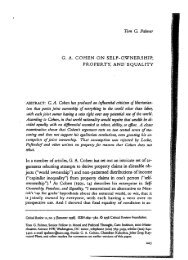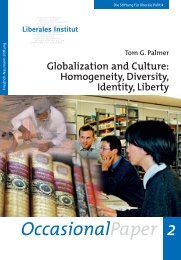Are Patents and Copyrights Morally Justified? - Tom G. Palmer
Are Patents and Copyrights Morally Justified? - Tom G. Palmer
Are Patents and Copyrights Morally Justified? - Tom G. Palmer
You also want an ePaper? Increase the reach of your titles
YUMPU automatically turns print PDFs into web optimized ePapers that Google loves.
No. 3] <strong>Are</strong> Palents <strong>and</strong> <strong>Copyrights</strong> <strong>Morally</strong> justified? 861<br />
to cooperate in the allocation of scarce resources. Intellectual<br />
property rights, however, do not arise from scarcity, but are its<br />
cause. As Arnold Plant observes,<br />
It is a peculiarity of property rights in patents (<strong>and</strong> copyrights)<br />
that they do not arise out of the scarcity ofthe objects<br />
which become appropriated. They are not a consequence of<br />
scarcity. They are the deliberate creation of statute law; <strong>and</strong>,<br />
whereas in general the institution of private property makes<br />
for the preservation of scarce goods, tending (as we might<br />
somewhat loosely say) to Leadus ‘to make the most ofthem,’<br />
property rights in patents <strong>and</strong> copyright make possible the<br />
creation of a scarcity of the products appropriated which<br />
could not otherwise be maintained.’ 59<br />
Scarcity of this sort being central to the legitimation of property<br />
rights, intellectual property rights have no legitimate<br />
moral grounding.<br />
VII. CONCLUSION<br />
Four possible theories of intellectual property rights have<br />
been examined: labor-desert, personality, utility, <strong>and</strong> “piggybacking”<br />
on rights to tangible property. In each case I have<br />
argued either that the particular arguments cannot be applied<br />
to ideal objects or that the arguments themselves are weak.<br />
This is not to deny that each contains some grain of truth, nor<br />
does this mean that they contribute nothing to our underst<strong>and</strong>ing<br />
of the moral foundations ofproperty.<br />
The idea of desert has an important place among our moral<br />
intuitions, although such moral intuitions may have their<br />
proper role in the moral order of the small group such as the<br />
family, <strong>and</strong> not in the extended order, where abstract rules<br />
prevail.’ 60<br />
159. A. PLAter, The Economic Theory Concerning <strong>Patents</strong> for Inventions, ~ti SELECTED ECO-<br />
NOMIC EssAYS AND ADDRESSES 36 (1974); see also F. HAYEK, Tna FATAL CONCEIT: THE<br />
ERRORS OF SOCIALISM 6 (1988):<br />
The difference between these [copyrights <strong>and</strong> patentsl <strong>and</strong> other kinds of<br />
property rights is this: while ownership of material goods guides the use of<br />
scarce means to their most important uses, in the case of immaterial goods<br />
such as literary productions <strong>and</strong> technological inventions the ability to produce<br />
them is also limited, yetonce they have come into existence, they can be<br />
indefinitely multiplied <strong>and</strong> can be made scarce only by law in order to create<br />
an inducement to producesuch ideas. Yet it is not obvious that such forced<br />
scarcity is the most effective way to stimulate the human creative process.<br />
Id. 160. See F. HAYEK, supra note 65, at 11-21. We learn ourmorality, Hayek argues,<br />
within the small group, notably the family, in which face.to.face interaction prevails.











